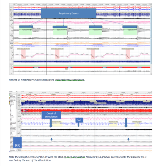Effects of Vagus Nerve Stimulation on Physiological and Sleep Parameters in Refractory Epilepsy Patients
Abstract number :
1.171
Submission category :
3. Neurophysiology / 3E. Brain Stimulation
Year :
2018
Submission ID :
501323
Source :
www.aesnet.org
Presentation date :
12/1/2018 6:00:00 PM
Published date :
Nov 5, 2018, 18:00 PM
Authors :
Karine Abou Khaled, Saint Joseph University and Christian-Georges Abou Nader, Saint Joseph University
Rationale: Vagus nerve stimulator (VNS) is approved for adjunctive treatment of refractory epilepsy. VNS therapy improves daytime alertness in some patients but conversely has been reported to produce excessive daytime sleepiness or sleep apnea in others. On the other hand we know that poor sleep can trigger seizures by itself. We opted to study direct effect of vagal stimulation on all physiological parameters, EEG and sleep parameters in selected patients with epilepsy aged 12 and above who complained of sleep disturbances, snoring, excessive daytime sleepiness or fatigue that appeared following implantation of VNS. Methods: Informed consent was obtained and patients were admitted to the sleep/ video-EEG unit for 2 consecutive nights with random allocations regarding to VNS status: VNS was kept “ON” (at baseline settings) during one night and turned “OFF” during the other night. The off period did not exceed 7 hours. The recorded parameters included: full head EEG (21 electrodes according to the 10-20 international system), EKG, nasal flow and pressure, snoring, oxygen saturation, sleep position, TTP, abdomen and chest movements in addition to placement of 2 electrodes to detect VNS activity.One neurologist (KAK) specialized in sleep and clinical neurophysiology did the interpretation being blinded to VNS status. The other author analyzed the direct effect of VNS on respiratory (RR) and heart (HR) rates in all sleep state. For each state, the rates were manually calculated at three points of the stimulation (initial, middle, late) for three consecutive cycles. Results: A total of 6 patients were included, mean age of 31 years (13-47), all had stable VNS parameters for more than 3 weeks preceding the study and were set on rapid cycling (38 to 51%) with current intensity of 1.75 to 2.5 mA. All of these patients denied diurnal side effects from VNS.VNS significantly affected sleep related parameters. There was increase of the respiratory disturbance index in all patients (p=0.03) between the nights “on” and “off”, with majority of events being obstructive hypopneas. This was unrelated to their body mass index.We believe that the transmission of the stimulation along the branches of the vagus nerve, especially the recurrent laryngeal nerve can lead to obstructive respiratory events. In fact, the stimulation of the intrinsic muscles of the larynx causes left vocal cord adduction and subsequently narrowing of the airway.We also noted a trend to have a RR increase with each vagal stimulation but no significant change in HR. This can be explained by possible complex interactions between the vagal afferent fibers and the respiratory centers in the medulla and pons. Conclusions: This is the first study looking at immediate effects of VNS on all physiological parameters during sleep. We confirmed some previous reports of its effects on respiration during sleep particularly aggravating or inducing sleep apnea syndrome. VNS improves quality of life of patients with epilepsy but should be used with care and requires adequate monitoring for sleep related complications. Funding: Research fund from Saint Joseph University- Beirut, Lebanon

.tmb-.png?Culture=en&sfvrsn=352a66a2_0)